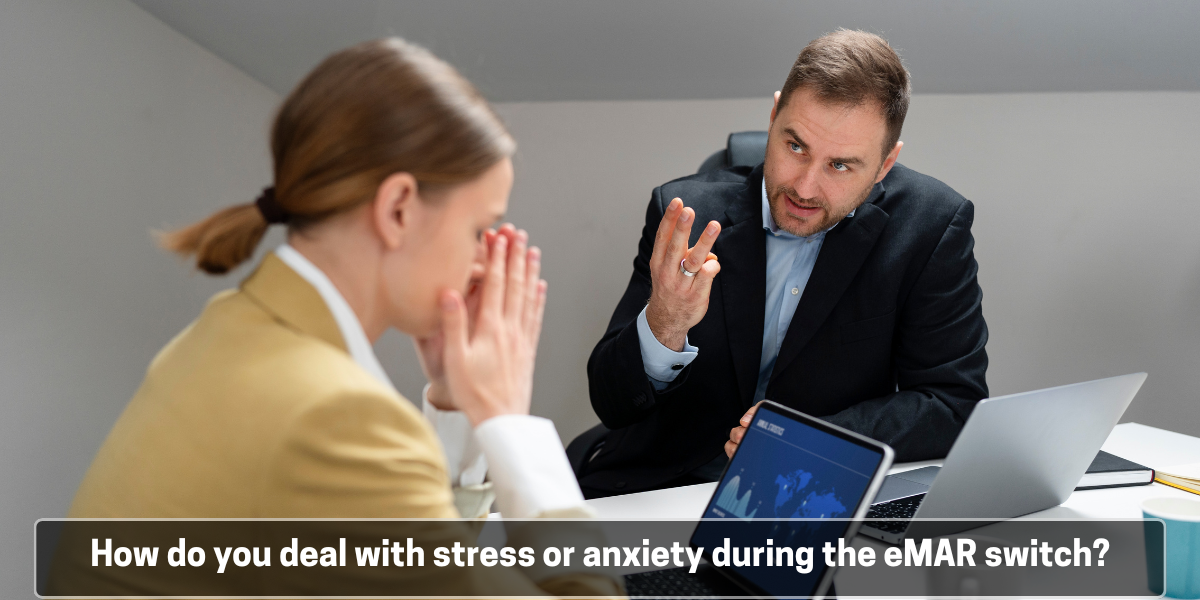Introducing an electronic medication administration record (eMAR) system in a care home is a major step forward, but it can also bring high levels of stress and anxiety for both staff and managers. Whether it’s fear of using unfamiliar technology, concerns about making mistakes, or simply adjusting to new routines, emotional responses are natural. Below are ways to manage stress during the switch, with practical steps and questions to consider along the way.
1. Start with clear communication
Clarity reduces stress. Uncertainty, mixed messages, and rumors often cause more anxiety than the change itself. Managers should explain early on what the eMAR system is, why it’s being introduced, how it works, and when each phase of the rollout will happen. Information should be simple, consistent, and repeated often—both in meetings and in writing. Staff are more confident when they know what to expect and feel included in the process.
Questions to consider:
- Has every team member received the same, consistent explanation of the change?
- Do staff understand when the system will go live and how their responsibilities will shift?
- Is information about training and support clearly shared in visible and accessible formats?
2. Involve the team early
Staff are more likely to support a change they helped shape. Managers should involve care staff, nurses, and medication leads in planning discussions. Ask them how they would like the system introduced and what they think will help their teams succeed. This early involvement builds ownership and reduces resistance.
Questions to consider:
- Have team members been asked for their input on the transition process?
- Are frontline staff involved in pilot testing or system trials before full rollout?
- Have concerns and suggestions from the team influenced the final plan?
3. Offer hands-on training and time to practice
Anxiety often stems from feeling unprepared. Proper training is one of the most effective ways to reduce stress. Offer hands-on, step-by-step training sessions. Allow staff to practice using eMAR with dummy profiles or test scenarios so they can learn without pressure. The more familiar staff are with the system before it goes live, the less anxiety they’ll experience.
Questions to consider:
- Are staff given enough time to learn the system at their own pace?
- Have they practiced using the software before being expected to use it in real care situations?
- Is refresher training available for staff who need more support?
4. Reassure staff that early mistakes will be handled supportively
Fear of being blamed increases stress. During the transition, it’s important to create a no-blame learning environment. Managers should reassure staff that early mistakes will be used as learning opportunities, not disciplinary action—especially when staff are still adjusting to a new system.
Questions to consider:
- Have you communicated clearly that mistakes during the early stages are expected and manageable?
- Do staff feel safe reporting problems or asking questions without fear of being judged?
- Is there a plan in place for reviewing early errors constructively?
5. Support staff mental wellbeing
Change can affect more than just workload—it also affects emotions. Staff who are used to doing things a certain way may feel overwhelmed or afraid of failure. Encourage open discussion about how staff are feeling. Offer emotional support in supervision sessions or informal check-ins. Signpost wellbeing resources when needed.
Questions to consider:
- Do staff know it’s okay to say they feel overwhelmed or anxious?
- Are managers and team leaders regularly checking in on how people are coping?
- Is there a safe and confidential space for staff to raise concerns?
After the initial rollout, take time to reflect on what worked and what didn’t. Invite feedback from staff at all levels. Use this information to improve future training or system use. Showing staff that their experiences matter helps build trust for future changes.







